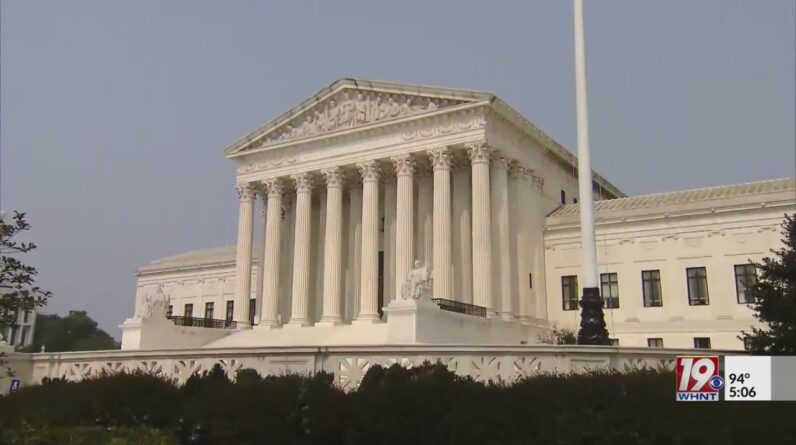
HUNTSVILLE, Ala. (WHNT) — Like much of the country, News 19 political analysts David Person and Jay Town have very different opinions about the US Supreme Court decisions handed down over the past year.
Town sees the court as following its “originalist” model, through a strict reading of the Constitution. Persona said the court seems determined to take away rights that have already been granted or affirmed to disadvantaged people.
Supreme Court strikes down Biden’s student debt forgiveness plan
On Friday, the high court ruled that President Biden did not have the authority to forgive more than $400 billion in student loan debt. A 6-3 majority disagreed with the Biden Administration’s contention that the 2002 law allowed forgiveness of $10,000, and in some cases up to $20,000, in loan debt.
The court’s majority said the administration needed congressional approval. Three dissenting justices argued that the law clearly allows the Secretary of Education to modify or waive loan payments in times of national emergency.
Political analyst Jay Town, a former U.S. attorney for northern Alabama appointed by then-President Trump, said the court’s majority got it right.
“What the Supreme Court actually said is that there is no reading of the word or any definition of the word ‘modify’ that could reach a legal delegation to the Secretary of Education that installed this program,” Town said. “There’s no reading of the word ‘modify’ that gets you to forgiveness, meaning the debt is canceled. And that kind of delegation, especially when you’re talking about $1.4 trillion in debt, the court said that such a large amount of debt, such a large and broad power, needs legislative action.”
Alabama higher education official says SCOTUS ruling on affirmative action could have unexpected impacts
Biden’s loan forgiveness program proposed about $400 billion in loan forgiveness. The $1.4 trillion referenced is the estimated total of all American student debt.
Political analyst David Person, a communications consultant and award-winning journalist, said he agrees there is an argument about how far the president’s authority extends on an issue like loan forgiveness. But he says the narrow argument offered by the court and his supporters misses the larger effort Biden had made to help people facing huge debt.
“It’s really hard to sympathize with the court’s decision on this,” Person said. “It seems to me that this is a question of the details of the language, at least in terms of the extent to which the president has the power to do what he did.
“But I think the bigger consideration is what this could have done for a large portion of people and how it would have benefited the country economically. Because if people aren’t saddled with student loan debt, that means they’re going to spend their money basically reinvesting in the economy.”
Over the past year, the Supreme Court has taken on a number of divisive issues in American life, ending abortion, curtailing affirmative action in college admissions, and ruling on immigration, school prayer, broadcasting of power plants, the Voting Rights Act, people of the same sex. cases of marriage and freedom of expression.
Town said the court is doing its job.
“I absolutely believe that the Supreme Court in the last 12 months has taken on a lot of serious controversial issues,” he said. “You don’t see a court having such a broad range of issues that are so controversial in our American fabric, in our political discussions and in our social discourse.
“I think the Supreme Court is operating in a way that we expect these justices to rule. They’re going to be originalists, they’re going to be textualists. They don’t have to find an outcome first and then craft the law and the Constitution around it. And I think this is absolutely the role of any court, especially our Supreme Court.”
Person said that along with his concerns about the court’s push to roll back the rights of historically disadvantaged groups, there are ethical questions that undermine the court’s “moral high ground.” Person pointed to the failure of Justices Clarence Thomas and Samuel Alito to disclose gifts, loans and trips provided by wealthy benefactors and the lucrative attorney recruitment work done by the wife of Chief Justice John Roberts, as example
“My take on the court is, first of all, this is a court that seems very focused on reducing the rights that have already been granted, or affirmed, to historically disadvantaged people,” he said. “This is extremely troubling and they’re doing it in the name of, I guess, originalist thinking about the Constitution. And of course I would say that originalist, you know, this kind of application of originalist thinking is flawed because the original Constitution it was defective.
“It was obviously flawed because it didn’t recognize the humanity of all people. It didn’t recognize the humanity of slaves, it didn’t recognize the humanity of indigenous people, it didn’t recognize the humanity of women. So acting like the original Constitution is a sacred document, I think it’s a fallacy.”
Close Modal
Suggest a correction
Suggest a correction
[ad_2]
Source link





